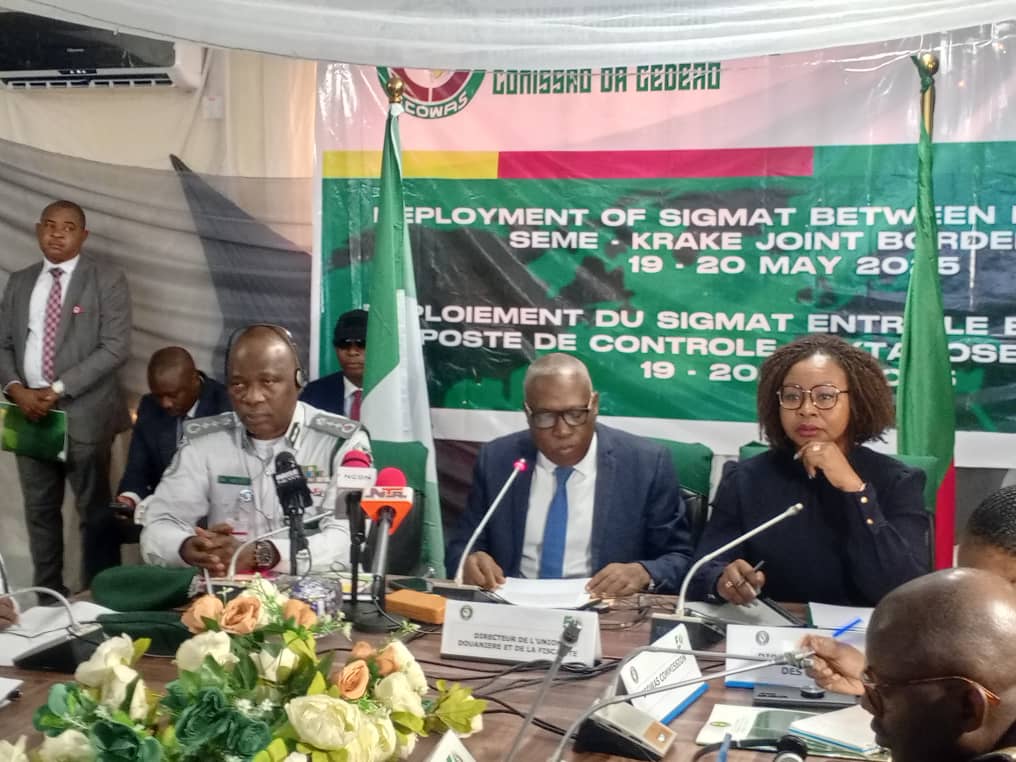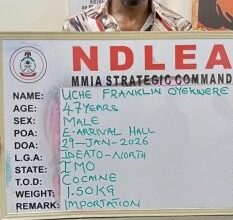
The Nigeria Customs Service (NCS) and the Customs Administration of Benin Republic on Monday jointly launched the deployment of the SIGMAT platform, aimed at boosting regional trade.
Comptroller General of Customs (CGC) Adewale Adeniyi and the Director General of Benin Customs Administration, Mme. Adidjath Hassan Zanouvii, unveiled the system during a press conference held at the Seme-Krake joint border post.
Speaking at the launch, CGC Adeniyi explained that the implementation of the SIGMAT platform is designed to connect both customs services, aiming to remove some of the challenges faced by operators.

Adeniyi reiterated that the system is resilient and intended to eliminate bottlenecks linked to international trade, noting that the platform has already worked effectively in seven other countries along the corridor.
He further expressed optimism about the platform’s success, saying that officers from the service have been trained to manage the platform with support from critical stakeholders.
According to him, the SIGMAT platform will foster cooperation between the two customs organizations, adding that it has the capacity to integrate with the B’ODOGWU system in Nigeria.
He assured stakeholders and other government agencies that the service will ensure proper enlightenment and sensitization about the newly launched platform for further implementation, noting that it will facilitate the movement of goods along the Lagos-Abidjan corridor.
On her part, the Director General of Benin Customs Administration stated that the implementation of the system will collectively address cross-border issues affecting both customs administrations.
She added that the SIGMAT connectivity between the two countries marks a major milestone in the collective pursuit of seamless trade integration and regional economic transformation across West Africa.
“I am sure you have heard some of the historical context of this project, which aims to digitalize and harmonize customs transit operations across our member states. The concept was conceived over a decade ago, and the electronic platform was designed to achieve these objectives. Primarily, we want to improve the visibility of goods in transit.
“We want to combat diversion and fraud along the Nigeria-West corridor. We also want to use the platform to foster inter-agency coordination and collaboration between us. For our stakeholders, we want to simplify procedures at the borders and, by doing so, reduce delays.
“Most importantly, we want to ensure that trade fosters revenue and prosperity. We want to enhance trade facilitation between our two countries. Of course, implementation has already started with deployments in several ECOWAS member states, such as Niger, Côte d’Ivoire, Mali, Ghana, and Togo, with the support and assistance of the ECOWAS Commission and the German Development Cooperation Agency.
“For us in Nigeria, SIGMAT represents our strategic ambition to align with regional digital customs standards and to modernize the globalization of our trade portfolio. We will be hearing about the current state of SIGMAT in the next few hours, possibly during the presentation by the technical team. We have some achievements to highlight.
“These include the development of SIGMAT, which is currently a standalone system tailored for the Nigerian customs landscape; the successful testing of real-time transit message exchange between Nigeria and our colleagues in Benin Republic; the marking and anonymization of entry and exit itineraries at this particular border station; the establishment of direct connectivity to the ECOWAS electronic hub, ensuring regional interoperability; and strengthened collaboration between our customs administrations through various technical meetings and consultations held over the past month.
“In the process, we have encountered several challenges, which I hope the technical team will address during their presentation. The most important challenge is the need for more extensive training and sensitization of our stakeholders.
“We must implement a robust stakeholder engagement strategy to ensure that we include not only our economic operators but also other government agencies involved in this process.
“Looking ahead, the Nigerian Customs Service sees many opportunities. We believe that in the near future, we will be able to expand SIGMAT deployments to additional border locations, particularly places like Ndiru, Chikanga, and the new facility planned for Sanya. We look forward to strengthening bilateral communication mechanisms to ensure timely technical engagement between our agencies and institutions.
“A very important priority is to collaborate with JIZ and ECOWAS on capacity-building programs and stakeholder sensitization. As we deploy these pilots, we also plan to establish a task force responsible for monitoring deployments, promoting successes, and addressing challenges.
“For governance purposes, we will continue to engage with the ECOWAS SIGMAT steering committee to share lessons learned and support other members in their implementation journeys.
“Distinguished ladies and gentlemen, today’s launch is more than just a technical achievement. It is a powerful demonstration of rigorous legality and institutional leadership. I urge us all to join in making this milestone a transformative step to turn our trade corridors into engines of prosperity, security, and opportunity for the people of West Africa.
“Let us remind ourselves that elaborate buildings and infrastructure like the one we are jointly occupying will not, on their own, facilitate trade, harmonize processes, interconnect systems, or enhance our collaborative spirit to address issues between us,” she explained.











